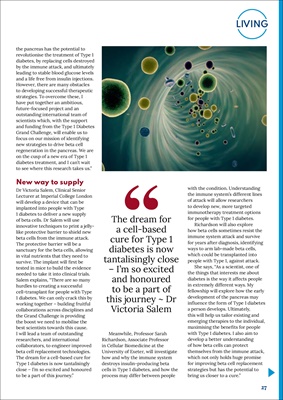
27
LIVING
the pancreas has the potential to
revolutionise the treatment of Type 1
diabetes, by replacing cells destroyed
by the immune attack, and ultimately
leading to stable blood glucose levels
and a life free from insulin injections.
However, there are many obstacles
to developing successful therapeutic
strategies. To overcome these, I
have put together an ambitious,
future-focused project and an
outstanding international team of
scientists which, with the support
and funding from the Type 1 Diabetes
Grand Challenge, will enable us to
focus on our mission of identifying
new strategies to drive beta cell
regeneration in the pancreas. We are
on the cusp of a new era of Type 1
diabetes treatment, and I can't wait
to see where this research takes us."
New way to supply
Dr Victoria Salem, Clinical Senior
Lecturer at Imperial College London
will develop a device that can be
implanted into people with Type
1 diabetes to deliver a new supply
of beta cells. Dr Salem will use
innovative techniques to print a jellylike
protective barrier to shield new
beta cells from the immune attack.
The protective barrier will be a
sanctuary for the beta cells, allowing
in vital nutrients that they need to
survive. The implant will first be
tested in mice to build the evidence
needed to take it into clinical trials.
Salem explains, "There are so many
hurdles to creating a successful
cell-transplant for people with Type
1 diabetes. We can only crack this by
working together - building fruitful
collaborations across disciplines and
the Grand Challenge is providing
the boost we need to mobilise the
best scientists towards this cause.
I will lead a team of outstanding
researchers, and international
collaborators, to engineer improved
beta cell replacement technologies.
The dream for a cell-based cure for
Type 1 diabetes is now tantalisingly
close - I'm so excited and honoured
to be a part of this journey."
Meanwhile, Professor Sarah
Richardson, Associate Professor
in Cellular Biomedicine at the
University of Exeter, will investigate
how and why the immune system
destroys insulin-producing beta
cells in Type 1 diabetes, and how the
process may differ between people
with the condition. Understanding
the immune system's different lines
of attack will allow researchers
to develop new, more targeted
immunotherapy treatment options
for people with Type 1 diabetes.
Richardson will also explore
how beta cells sometimes resist the
immune system attack and survive
for years after diagnosis, identifying
ways to arm lab-made beta cells,
which could be transplanted into
people with Type 1, against attack.
She says, "As a scientist, one of
the things that interests me about
diabetes is the way it affects people
in extremely different ways. My
fellowship will explore how the early
development of the pancreas may
influence the form of Type 1 diabetes
a person develops. Ultimately,
this will help us tailor existing and
emerging therapies to the individual,
maximising the benefits for people
with Type 1 diabetes. I also aim to
develop a better understanding
of how beta cells can protect
themselves from the immune attack,
which not only holds huge promise
for improving beta cell replacement
strategies but has the potential to
bring us closer to a cure."
The dream for
a cell-based
cure for Type 1
diabetes is now
tantalisingly close
- I'm so excited
and honoured
to be a part of
this journey ~ Dr
Victoria Salem